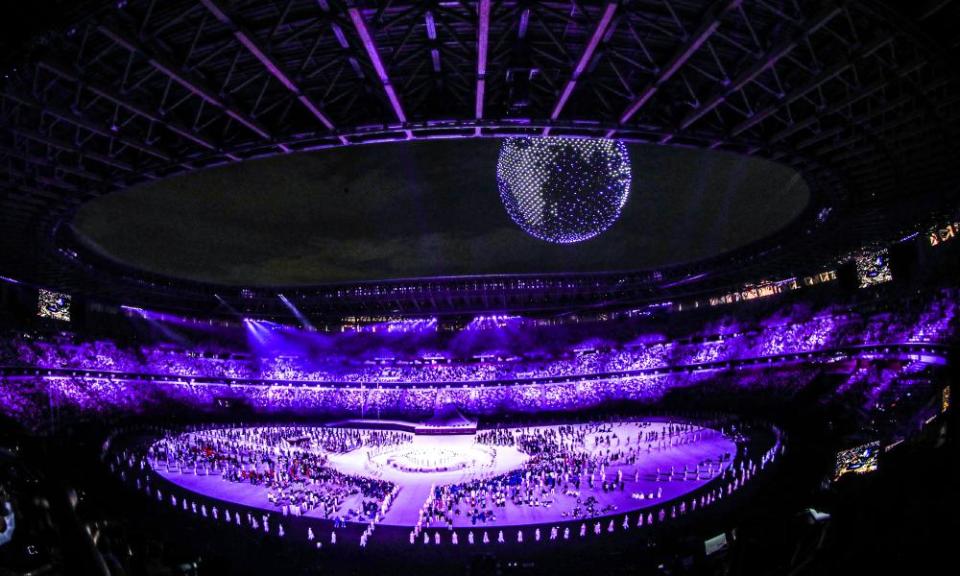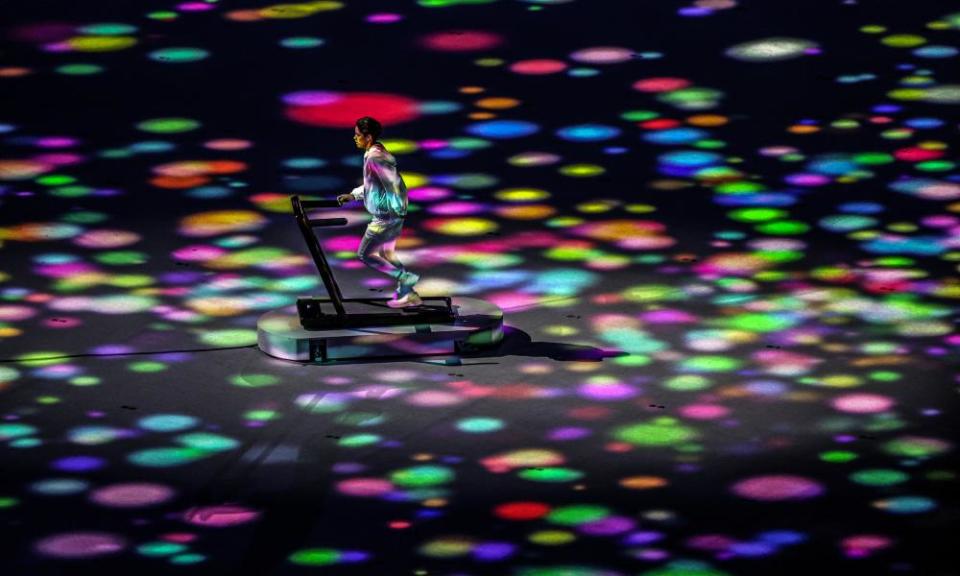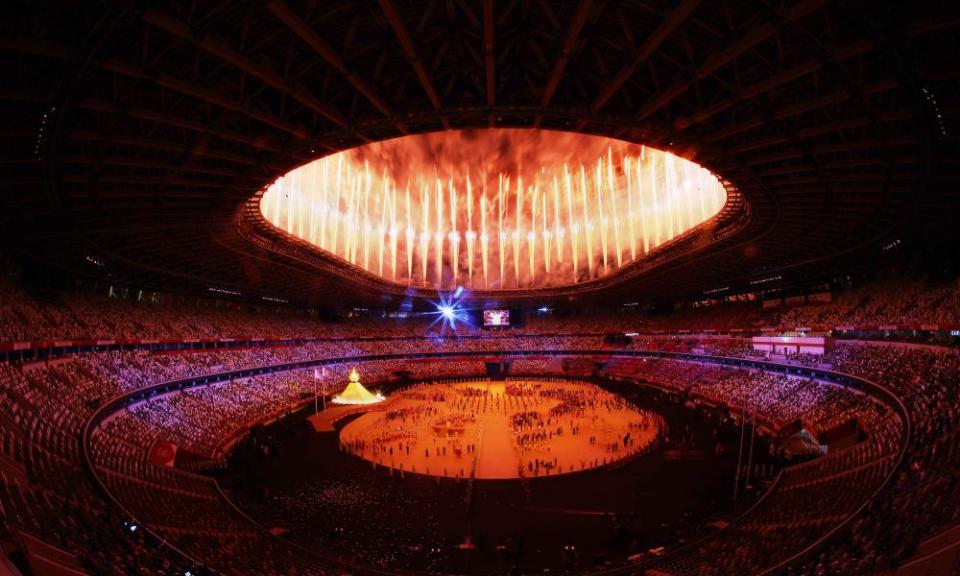The Olympics are here, for better or worse: time to get on with the show

Unloved, uncertain, but somehow oddly unstoppable. Tokyo 2020 is finally at the door, a little weathered and wild, a year out of whack, skinny hand rapping at the knocker. It turns out this really is going to happen after all.
The Olympics has claimed to be many things down the decades, most often a beacon of hope, cauldron of joy, saucerful of love and all the rest of it. As the opening ceremony at the Tokyo National Stadium began to wind down at around 11pm local time, Thomas Bach could be heard making a series of similar generic claims about the Games as a force for peace, tolerance and freedom, a speech he will no doubt repeat with a sense of furious reforming zeal at the Beijing 2022 Winter Olympics.
Related: Tokyo Olympics 2020: Naomi Osaka lights cauldron at opening ceremony – live!
Tokyo 2020 is of course something very different, the Olympic Games as an act of duty, a matter of contracts signed and political capital staked, staged in a city where the health system is in danger of being swamped by a mix of Covid-surge and high summer heatstroke. And yet for all its failings, not least the appalling imposition on the people of Tokyo, it was still hard to shake the feeling on opening night that these Games might provide some illumination too.
This was certainly a beautiful opening ceremony, lovely and sad and light as air. The early moments of the musical show were almost unbearably tender, the performers moving among one another slowly and with a – frankly devastating – sense of grace and care. Even as things got more exuberant towards the end there was a mournful quality, like a vast, illuminated formal wake.

Eventually the athletes emerged in a pared-back procession. There were 22 from a possible 376 in the Team GB lineup, the flag carried jointly by rower Mohamed Sbihi, who is enormous, and sailor Hannah Mills, who isn’t. A year and half of anxiety, compromise, quarantine, nose splints, locked doors, and last-minute fears had brought them to this point. They both looked delighted just to be out there walking across the stage.
And now, what exactly? At moments like these it is customary to “take the temperature”, to talk in scene-sketching terms about the atmosphere around the host nation. The sun is usually rising over the harbour bridge. The mood in the city is tense but hopeful. And sport, as ever, fills the skies, drunk on its own moonshine.
That bit won’t take too long this time. Tokyo is, like everywhere else, entirely caught up with other stuff right now. It has become a habit to call these the Cursed Olympics, although the problem here isn’t so much the Games as the series of bewildering events currently masquerading as “reality”. In the middle of which the Olympics is somehow still happening, and happening in way that takes us pretty much off the map.
Related: Tokyo 2020 – all your key Olympic questions answered
There has been an urge to compare these Games to previous imperilled versions, from the make-do-and-mend of 1920, to the horrors of Mexico, and more hopefully the austerity games of 1948, when the torch came down the Thames in a rowing boat and everyone just got on with it. But this isn’t really like that, because it isn’t really like anything.
There are so many elements that have felt wrong – from public unease, to such relative mundanities as Russia (remember them?) serving a flag-based doping ban. At times the case against staging these Games has felt overwhelming.
There are a few things worth saying about this. For a start, Europe has just held a month-long football tournament that involved a larger travelling mass and higher infection rates. And second, well, this is simply the way of the Olympic Games, out there orbiting the globe like a mobile sporting super-state in search of the most ripe and biddable host. The combined expense around Tokyo 2020 must be close to £20bn. Nobody was ever going to call this thing off. With the ceremony done, there is nothing left to do but face the lights and get on with the show.
The focus can at least shift now to the one unarguable note of grace – the athletes, who have worked for this in the dark and who are now having their moment in time. The next 16 days will see 339 events across 33 sports, kicking off this weekend with medals in archery, shooting, fencing, road cycling, judo, taekwondo and weightlifting.

There are some brilliant sporting stories to follow. Can Teddy Riner of France, the 10-times world judo champ, claim his GOAT-level third Olympic heavyweight title? Katie Ledecky, swimming royalty, is in the pool this weekend, as is Britain’s own breaststroke king Adam Peaty. Speed climbing, BMX freestyle, skateboarding and other novel events will offer their own charms, either side of the A-listers of track and field.
The women’s sprints could be the headline event, with Shelly-Ann Fraser-Pryce of Jamaica looking to become the first woman to win three Olympic titles at 100m, and the great Allyson Felix one medal away from Carl Lewis’s US record. The American track and field team is an object of fascination in itself, from Ryan Crouser, out there tossing his orb further than anyone else in history, to Sydney McLaughlin and Dalilah Muhammad’s showdown in the 400m hurdles, to Erriyon Knighton in the 100m, 17 years old and fresh from breaking Usain Bolt’s under-20 world record.
Related: Tokyo Olympics opening ceremony – in pictures
And yes, it is really happening after all. The host nation deserves our gratitude for staging these games in extremis, and shared apologies for the imposition. Tokyo is a sprawl, but also a careful place.
The Olympics, meanwhile, is a great, slobbering mess of Colombian TV crews and Norwegian VIP delegations. Little wonder a large part of Tokyo didn’t want this mingled human mass here, stamping up and down the stairs, spilling its viral load on the living-room carpet.
A great deal will depend on how courteous the visitors are, and how carefully they respect the limits. This is a trip into an open, slightly fearful space. But as the final light show faded in the sky above the national stadium it was hard to shake the feeling Tokyo had already given us something beautiful, and oddly consoling.

 Yahoo Finance
Yahoo Finance 